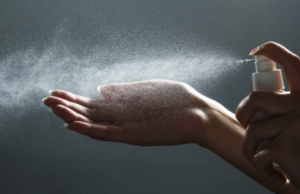Exploring DIY Organic Makeup Fixers

For the eco-conscious beauty enthusiast, the quest for flawless makeup can be a balancing act. We all know the struggle – that meticulously applied makeup starts to show signs of wear by midday. But before reaching for chemical-laden setting sprays, let’s explore a more sustainable solution: DIY organic makeup fixers!
This article delves into the world of DIY organic makeup fixers, offering a balanced perspective on their creation and use. We’ll explore the science behind makeup fixers, unveil the potential of natural ingredients, and guide you through crafting your own fixer recipe. We’ll also discuss the trade-offs involved and help you decide if the DIY approach is the perfect fit for your beauty routine.
The Power of Makeup Fixers
Makeup fixers, also known as setting sprays, work like invisible shields on your skin. They create a thin film that helps hold makeup in place, preventing smudging, fading, and transfer throughout the day. This is achieved through two key components:
-
Film Formers: These ingredients create a physical barrier on the skin’s surface, essentially holding your makeup in place.
-
Humectants: These attract and retain moisture, keeping your skin hydrated and preventing makeup from caking or flaking.
The good news? Natural ingredients can offer similar functionalities, paving the way for a more eco-friendly approach to makeup setting.
Demystifying Natural Ingredients
While they may not be as potent as their synthetic counterparts, several natural ingredients hold promise for DIY makeup fixers. Here’s a breakdown of some popular options, along with their benefits and considerations:
-
Aloe Vera Gel: This superstar ingredient is a natural humectant, keeping your skin hydrated and preventing makeup from drying out. However, it may not offer the strongest hold for long-lasting wear.
-
Green Tea: Packed with antioxidants, green tea soothes and tones the skin while providing a slight tightening effect that can help hold makeup in place. Be mindful that it may dry out sensitive skin types.
-
Witch Hazel: This astringent ingredient helps control shine and minimize pores, creating a smoother canvas for makeup application and enhancing its longevity. However, witch hazel can be too drying for some skin types, so a patch test is recommended.
-
Vegetable Glycerin: Another humectant, vegetable glycerin attracts moisture to the skin, keeping makeup looking fresh. It can leave a slightly sticky feeling on the skin, so use it sparingly.
Remember, a little goes a long way with these potent ingredients! Experimentation is key to finding the perfect balance for your skin type.
DIY Magic with Open Eyes: Crafting Your Perfect Organic Fixer (3 Recipes!)
Now, let’s get hands-on! Here are three fantastic organic makeup fixer recipes tailored to different skin types:
1: The Hydrating Hero (For Dry Skin)
- 2 tablespoons aloe vera gel
- 1 tablespoon rose water
- 2 drops of lavender essential oil (optional)
2: The Mattifying Marvel (For Oily Skin)
- 2 tablespoons witch hazel
- 1 tablespoon green tea (brewed and cooled)
- 1 teaspoon vegetable glycerin
3: The All-Rounder (For Normal Skin)
- 1 tablespoon aloe vera gel
- 1 tablespoon witch hazel
- 1 tablespoon green tea (brewed and cooled)
Instructions:
- Combine all ingredients in a clean spray bottle.
- Shake well before each use.
- After applying your makeup, hold the bottle at arm’s length and mist your face in a light, even layer.
Pro Tip: Test the fixer on a small area of your skin before applying it all over your face to ensure you don’t experience any irritation.
It’s important to remember that DIY fixers may not be as long-lasting as commercial products. However, with a little experimentation, you can create a natural solution that complements your beauty routine and values.
DIY vs. Commercial Fixers
While DIY fixers offer an eco-friendly and budget-conscious approach, there are trade-offs to consider when compared to commercial products:
-
Effectiveness: Commercial fixers are often formulated for longer wear and may be more effective, especially for oily skin or humid environments.
-
Preservatives: DIY fixers lack preservatives, meaning they have a shorter shelf life and may be prone to bacterial growth. Commercial fixers contain preservatives to ensure stability and safety.
-
Customization: DIY allows you to tailor the recipe to your specific skin type and needs. However, finding the right balance of ingredients can be a trial-and-error process. Pre-made fixers offer a variety of formulas for specific needs, eliminating the need for experimentation.
-
Convenience: DIY requires time and effort to create and maintain your fixer. Pre-made options offer immediate convenience.
The Bottom Line: DIY fixers are a great eco-friendly and budget-conscious option, but they may not be as effective or long-lasting as commercial products. Consider your lifestyle and makeup needs when making your decision.
Finding the Green Path That’s Right for You: Choosing Your Ideal Fixer
Ultimately, the decision of whether to DIY or go commercial depends on your individual needs and priorities. Here are some questions to consider:
-
How important is long-lasting wear for you? If you need your makeup to stay put all day, a commercial fixer might be a better choice.
-
Are you comfortable with a shorter shelf life for your makeup fixer? DIY fixers typically need to be used within a few weeks.
-
Do you enjoy experimenting and creating your own beauty products? The DIY route can be a fun and rewarding experience.
-
Are you sensitive to certain ingredients? DIY allows you to control exactly what goes into your fixer.
By carefully considering these factors, you can choose the makeup fixer that aligns best with your eco-conscious beauty goals and personal preferences.

Frequently Asked Questions about DIY Organic Makeup Fixers
Here are some frequently asked questions about DIY organic makeup fixers:
- Q: Can I use essential oils in all my DIY fixers?
A: Not necessarily. While some essential oils like lavender offer a pleasant scent, they can be irritating to the skin. Always do a patch test before applying any essential oil to your face.
- Q: My DIY fixer feels sticky. What can I do?
A: This might be due to too much vegetable glycerin. Reduce the amount in your recipe or try substituting it with rose water.
- Q: How can I make my DIY fixer last longer?
A: Store it in the refrigerator to prevent bacterial growth. Remember, due to the lack of preservatives, it will still have a shorter shelf life than commercial fixers.
By embracing DIY organic makeup fixers, you’re not just making an eco-conscious choice, you’re also taking control of what you put on your skin. With a little experimentation and an understanding of the trade-offs involved, you can find the perfect green solution to keep your makeup looking flawless throughout the day.
So, are you ready to unleash your inner green alchemist? Share your DIY experiences and favorite recipes in the comments below! Let’s create a community of eco-conscious beauty enthusiasts who embrace natural solutions!

